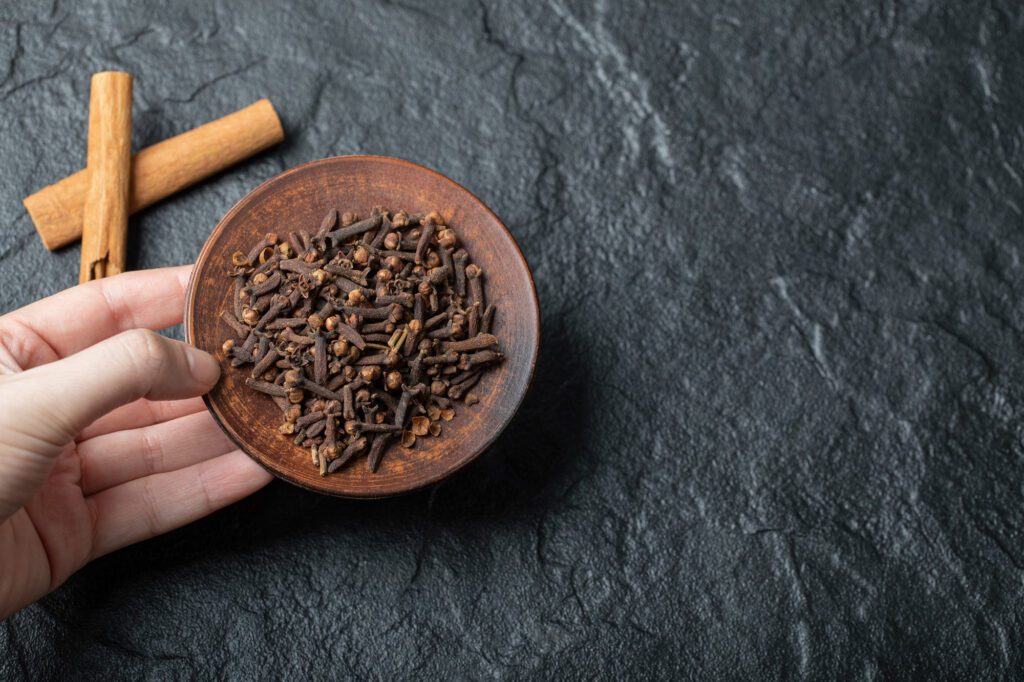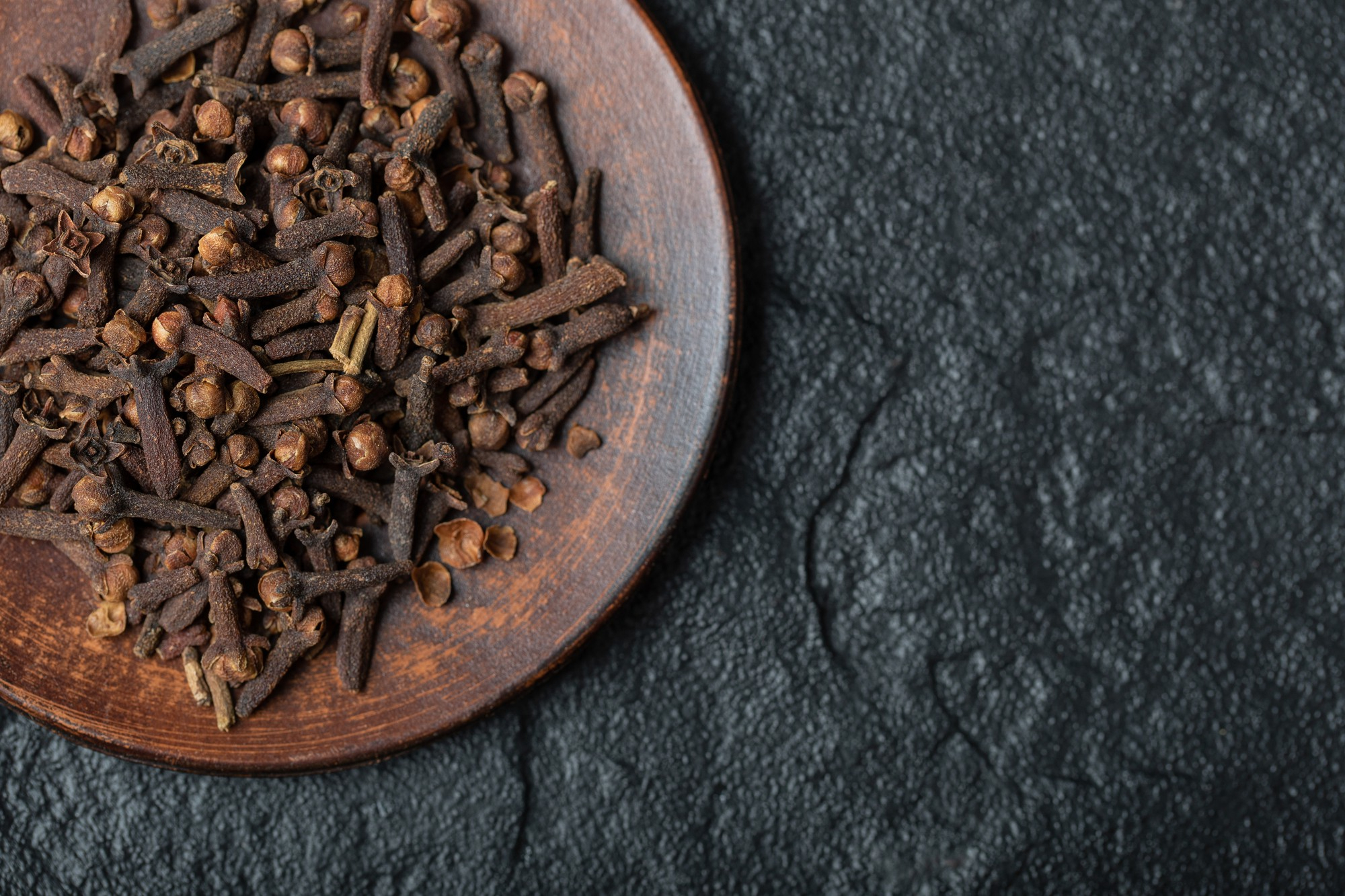Here, we are sharing information on the topic “benefits of clove in cough.” Coughs can be very irritating, regardless of the cause—colds, allergies, or respiratory infections. It can interfere with your regular activities and sleep patterns, which can ultimately make you feel exhausted. Clove, however, has therapeutic qualities that can help relieve cough symptoms. Its relaxing, antimicrobial, and anti-inflammatory qualities make it a useful supplement to your cough relief regimen.

benefits of clove in cough
Compounds found in clove oil may help relieve coughing and respiratory pain. The following are a few possible advantages to applying clove oil to a cough:
-
Anti-Inflammatory Characteristics
The anti-inflammatory characteristics of clove are well known. It might lessen airway inflammation, which is one factor that contributes to coughing and discomfort.
-
Antibacterial and Antiviral Effects
Cloves have antibacterial and antiviral qualities that help fight respiratory illnesses’ root causes and maybe ease coughing fits.
-
Expectorant Properties
Clove has expectorant properties that assist thin mucus and facilitate ejection. Those who have phlegmy coughs may find this especially useful.
-
Natural Cough Suppressant
Clove may have a relaxing effect on the cough response, improving sleep quality and facilitating day-to-day comfort.
Clove Tea
A Guide to Using Clove for Cough Relief, One easy and efficient way to benefit from cloves for cough treatment is to make clove tea.
- First, bring a cup of water to a boil.
- Pour one or two whole or powdered cloves into the boiling water.
- Give it five to ten minutes to steep.
- Pour the hot tea through a strainer.
- Lemon or honey can be added for taste and calming benefits.
Inhaling Clove Oil
Cough and congestion can be relieved by inhaling clove oil. Asthma, bronchitis, coughs, colds, and other upper respiratory disorders can all be effectively treated with clove oil, according to the Multidisciplinary Digital Publishing Institute (MDPI).
- Bring a kettle of water to a rolling boil.
- To the heated water, add a few drops of essential clove oil.
- With caution to prevent burns, place your face over the pot and breathe in the steam. This may facilitate clearing the airways and reduce coughing.
Honey with Clove Infusion
Honey laced with cloves is another useful treatment. Take these actions:
- A few cloves should be mashed and combined with honey.
- Allow the mixture to settle for a few hours or perhaps overnight.
- To relieve your cough, take a teaspoon of the infused honey as needed.
Paste with cloves and ginger
- Another benefit of ginger is that it relieves coughs.
- Blend the ginger and cloves to a paste, and take a little as needed.
- This paste helps lessen throat irritation and inflammation.
Warnings and Things to Think About
Clove is a useful natural cough cure, but it’s necessary to use it carefully and take the following into consideration:
Dosage: Take care not to use too much clove, as this could cause an upset stomach or other negative effects.
Allergies: Cloves may cause allergies in certain people. When experimenting with clove for the first time, start gently and keep an eye out for any negative side effects.
Children and Expectant Mothers: Before administering clove remedies to children or expectant mothers, it is imperative to speak with a healthcare provider.
Medication Interactions: Before using clove as a remedy, consult your healthcare provider if you have any underlying medical issues or are currently taking any prescriptions. Cloves have the potential to interfere with some medications.
Chronic Cough: Although cloves can help with sporadic coughs, it’s best to see a doctor if you have a chronic or severe cough to rule out any underlying medical conditions.

Frequently asked questions
(benefits of clove in cough)
How do you use cloves for a cough?
Answer: Cloves: Packed with anti-inflammatory properties, cloves can be used to treat sinusitis, sore throats, coughs, and colds. Cloves can be eaten raw, mixed with hot water and drunk first thing in the morning, or added to a cup of chai.
What are the benefits of chewing cloves?
Answer: “Chewing cloves in the morning can increase saliva production, aiding in the digestive process. Moreover, cloves lessen acidity and nausea. Cloves might have anti-aging benefits. They are effective as a suppressant for coughs, “said Rohitha O R, a dietitian at Amrita Hospital in Kochi’s Department of Clinical Nutrition.
Who should not take cloves?
Answer: Those who have bleeding issues may have bleeding after consuming clove oil. Surgery: Chemicals in cloves have the potential to lower blood sugar and impede blood coagulation. It may induce bleeding during or after surgery, or it may interfere with blood sugar regulation. Give up using clove at least two weeks prior to the planned procedure.
Conclusion
(benefits of clove in cough)
In conclusion, it has been established that cloves may be useful in reducing cough symptoms. Cloves include essential components like eugenol, which have been shown to have anti-inflammatory, antibacterial, and analgesic effects. These qualities help to explain why cloves work so well for cough relief. Cloves are a useful natural medicine because of their capacity to relieve cough-related pain, decrease mucus production, and soothe throat irritation.
So, this is how the topic “benefits of clove in cough” has been addressed.
- For more information related to these topics, click here.
- You may also visit our Instagram page by clicking here.
- You may also visit our YouTube channel by clicking here







[…] For more information related to these topics, click here. […]